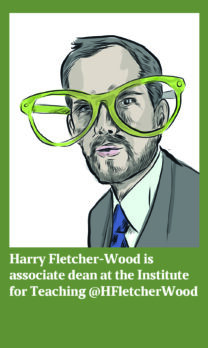Guest reviewer Harry Fletcher-Wood shares his top picks from the blogosphere this week.
Assessment objectives: an Ofqual concern for Ofqual people; there is nothing for you here!
By James Theobald
James Theobald begins obliquely, perhaps unsurprisingly for those who know his blog, with a trip to the doctor.
He’s troubled to hear the problem is “prostaglandins. They are a group of lipids. When your cells are damaged they release them. You need to stop your cells from producing these prostaglandins.” It turns out this means ibuprofen. “You could have just told me this straight away,” Theobald says. “I have some ibuprofen in my pocket.” The doctor explains, however, that it’s important he knows the objective of the treatment.
Theobald likens such unwanted information to assessment objectives, which are nothing more than “vague catch-all concepts” that tell pupils nothing they need to know. He concludes that teachers should focus on teaching students how to respond to questions.
What I learned from my learning styles research project back in the day
By Penny Rabiger
In 2000, when she was working towards a masters, Penny Rabiger decided to test each of her student’s learning style (and her own). “Amazingly, I then taught an entire class of 27 kids, with each using their preferred learning style as identified by the test.” Students tried harder, did more homework and their grades improved, in her subject and in others.
Rabiger attributes this to the enthusiasm, trust and metacognition that she and her students poured into their learning as a result, although she “also learned that arranging every lesson in such a detailed, multi-faceted and involved way would kill me if I had to do it for every lesson and for every child”.
She concludes that “even though it might be hugely embarrassing now to admit that I ever dabbled in the dark arts of learning styles, I am really grateful that I did.” The post does not seek to encourage teachers to imitate this: instead, it both evokes a past era and exemplifies the merits of meticulous examination of learning.
In praise of complex terminology
By Erin Miller-Coast
Erin Miller-Coast recently reread Mark Forsyth’s The Elements of Eloquence: it spoke to her in a way that it did not when she trained to teach. “It’s full of wonderful and majestic literary terminology; some obscure, some we unknowingly use all of the time. You will quiver in awe as you encounter terms such as ‘epiplexis’.”
Miller-Coast argues for the importance of using such terminology in teaching English. Teaching four different types of rhetorical question (“epiplexis, anacoenosis, hypophora and anthypophora”) helps her students to move away from generic responses such as “the use of rhetorical question makes the reader feel like they are being spoken to directly”.
Instead, they are able to make “detailed and specific comments about the use of rhetorical questions, eg, ‘The speaker’s rhetorical question functions as a call and response with their audience, which can feel empowering due to the feeling of being united with one another’.” A generic response was no longer necessary. Even if students forget the key terms, learning the questions helps them to consider the range of functions and effects of rhetorical questions more carefully. This post taught me new words, taught me more about rhetorical questions, and provided useful advice I’ve already passed on to a trainee: Miller-Coast proved all her points.
These high school journalists investigated a new principal’s credentials. Days later, she resigned
By Samantha Schmidt
For a bit of light relief, I recommend finding out what happened when a group of high school journalists in the US began investigating their newly appointed principal and found some discrepancies in her credentials. Students “were at a loss that something that was so easy for them to see was waiting to be noticed by adults”. This Washington Post story explains what their investigation revealed and the consequences.













Your thoughts